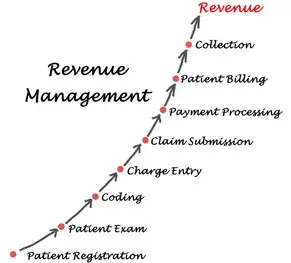The Medicare risk adjusted payment model is one of the major changes that have impacted physician practice revenue since it was introduced. The Centers for Medicare & Medicaid Services (CMS) uses the HCC (Hierarchical Condition Category) risk stratification strategy to determine level of payment for Medicare Advantage (MA) Plans. Risk-adjusted payment is based on the differences in patients’ medical diagnoses and health outcomes. Sicker patients with multiple chronic conditions are assigned higher risk scores. Accurate HCC coding is therefore an important element of revenue cycle management in physician practices.
HCC Codes – Implications for Practice Reimbursement
Under HCC coding, reimbursement depends on the patient’s diagnosis: the more severe the diagnosis, the higher the risk score, and the greater the reimbursement rate for the MA plan. CMS refers to HCC codes as “payment multipliers”.
With about 70,000 diagnosis codes in ICD-10-CM, compared to about 14,500 ICD-9-CM codes, accuracy in medical coding is not an easy task for a physician’s practice. The guideline under the risk adjustment model is to choose a primary diagnosis:
- to describe the main reason for the visit/encounter
- to list additional codes that describe any coexisting conditions
Documentation has to support the submitted diagnoses. Physicians should ensure that the medical record support the HCC and also specify the provider’s assessment and plan for the management of the illness/condition. To receive appropriate payment, the physician needs to examine the patient each year and ensure current, specific and compliant documentation of the status of all chronic and acute conditions.
HCC Coding Services to Maximize Revenue
Physicians caring for patients enrolled in Medicare managed care plans stand to lose revenue if they do not adapt to these changes. Partnering with a reliable medical coding company can ensure accurate diagnosis coding. Recent changes that CMS has brought which physicians need to be aware about include:
- Multiple iterations of the ICD-10 HHS-HCC crossover created to account for annual changes in the preliminary ICD-10 code sets through 2016
- General Equivalence Mappings (GEMs), the tool for translating between the ICD-9-CM and ICD-10-CM code systems
- Combination mappings for ICD-10 codes with multiple concepts
Professional companies have AAPC-certified coders who undergo continual training and are aware about the latest CMS rules and guidelines related to HCC coding. The support of a reliable service provider will go a long way in ensuring accurate documentation and coding of appropriate medical care for high-risk, high-complexity conditions, thereby ensuring maximum reimbursement.



0 Comments